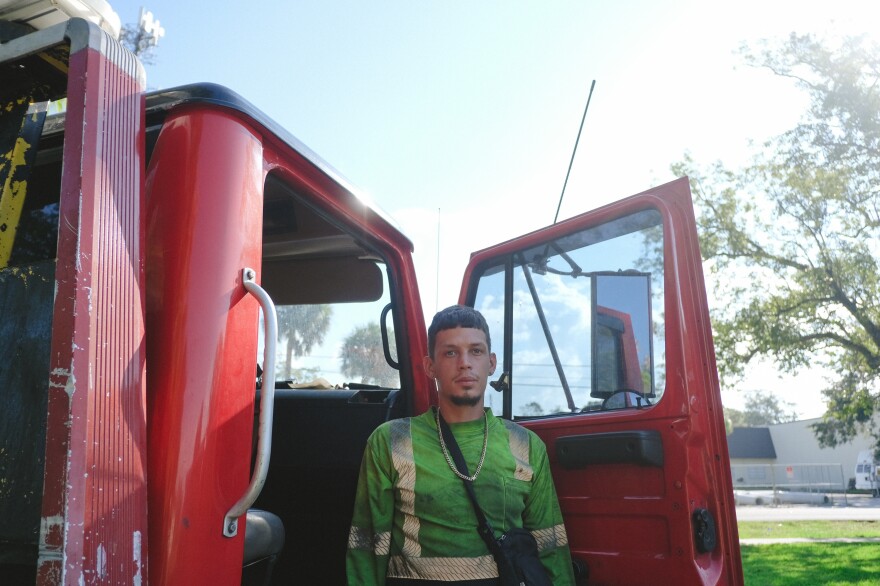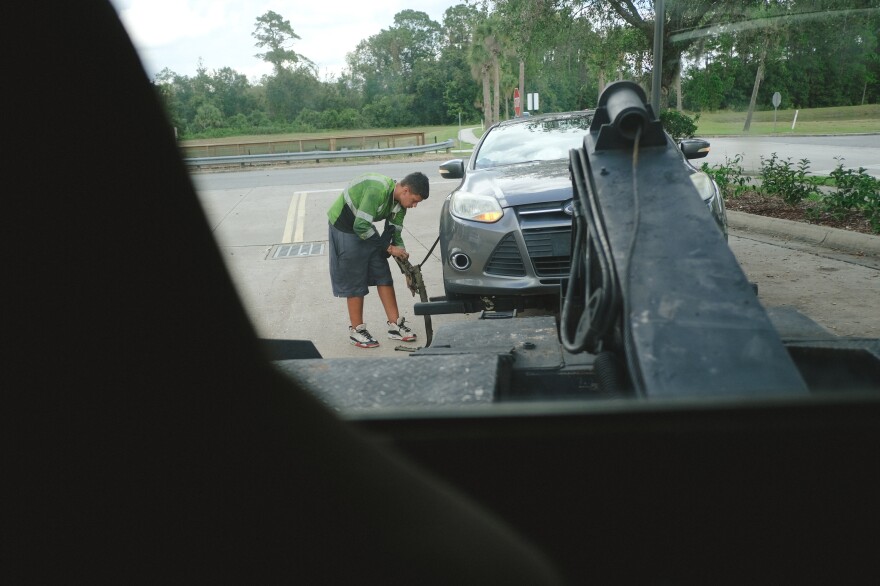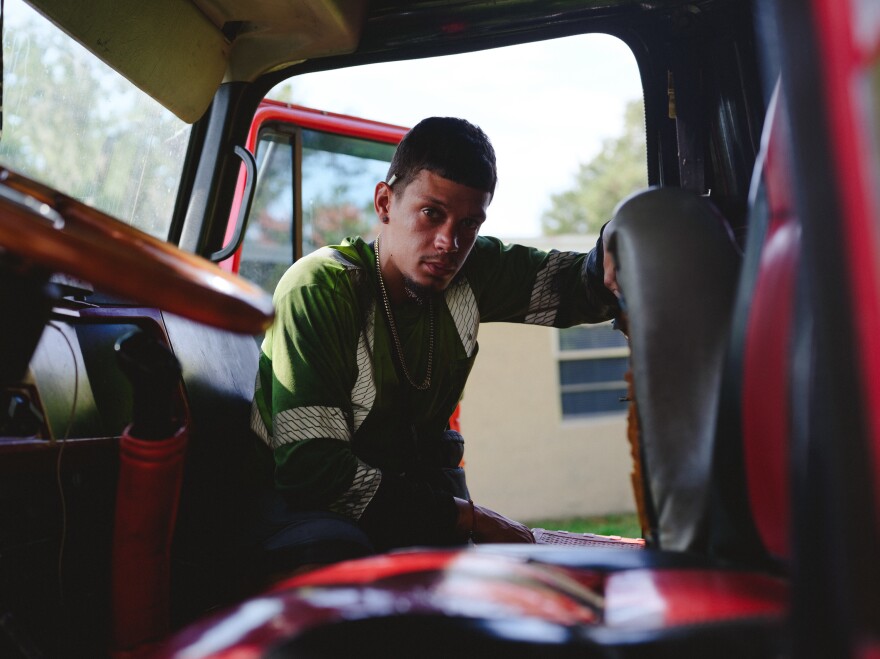ESTERO, Fla., — Hurricane Ian ruined hundreds of thousands of vehicles in South Florida this fall. They were found tossed, submerged and drying out on roads, barrier islands, canals, garages and driveways. It was a bonanza for tow truck drivers, who got inundated with work, lifting and moving wrecked and waterlogged vehicles.
In late September, photos of wrecked homes, businesses and boats competed with images of ruined vehicles. Salt water damage will claim car engines, chassis and interiors in the months ahead. For Florida, as well as parts of North Carolina and Virginia, property damage estimates are as high as $70 billion.
The next steps for homeowners and motorists alike are often hard to navigate.
CARFAX has estimated 358,000 vehicles were damaged by Ian. Most of the cases were in Florida.
Yamil Villafane, a 27-year-old driver who runs a towing service from Orlando, has seen his fair share of them.
There was so much work, in fact, that he had to live in his truck the first couple of weeks after the storm.
"This is not for everybody," Villafane said while on the road one day. "You have to be really disciplined to be out here."


First responders often filled the available hotels and motels right after the hurricane.
"Cause there's no hotels, so there's nothing else I could do," Villafane says, "just take my truck and look for a place I could stay. So I can lay my head down. And then I had to go to the gas station so I can shower."
Villafane's days just after Ian were a frenzy taking jobs one after another, jumping back on the road, especially in the Fort Myers area. As the workload slowed down, he stayed with his parents in Orlando and worked closer to their home. Each year, he says, he decides whether he's working in Florida for six months or the entire year, flying up to Philadelphia to check on things a weekend here or there. Philly is his home.
He says he owns three trucks and received most towing offers on an app that offers him bids on jobs throughout the state. Towing requests were constant, he says. He would curl up in the cramped space of his cab, sleeping near 18-wheelers three hours a night.
Most of the time, he chose work over sleep, deciding the hustle was worth it.
"Yeah, it's worth it," he said. "You just have to be dedicated. If you are not dedicated, it's not something you should be doing.".
He averaged 5 to 7 vehicles each day and earned about $300 to $400 per job. He was able to accept more jobs because an uncle drives one of Villafane's trucks.
It wasn't just vehicles stuck on the side of the road. Villafane says he moved about a dozen luxury cars from private homes after the waters receded.
"Porsche, Ferraris, Lamborghinis, Panameras, Bentleys, all the exotic cars," he said.


Villafane says while he uses Copart, a worldwide service that handles online auctions, resale and salvage of vehicles for a lot of bids on towing, it's not the only way he gets business. He says he charges $100 an hour. Sometimes stranded motorists wave him down on busy highways and streets. He stops occasionally en route to other jobs, if he can.
For example, a little over a week after the storm, Villafane was working on the shoulder of I-75 South, maneuvering the truck's lifting boom on a Honda Civic. A handyman was stranded in his truck about 200 feet behind the Honda. He walked up to Villafane. They spoke in Spanish, the handyman asked if he could get his truck towed to the nearest garage.
Villafane asked for $300. When the handyman told Villafane he couldn't pay that much, they agreed on $200. But after the tow, Villafane says the handyman told him he didn't have $200 in his wallet, and wouldn't be able to raise the rest.
"Like, all I got was $140," Villafane says. "So, well, what would you do? Lose the $140?"

When he started his business seven years ago, customers often took advantage of him, paying less than they agreed. Nowadays, Villafane decides case by case. Sometimes, he agrees to a lower price because the person reminds him of the discount he would offer his own family. But Villafane knows his rights. Nowadays, after he moves a car, he is prepared to keep a vehicle tethered to his tow truck if a driver tries to underpay for the work, especially if he believes the customer is capable of paying the agreed-upon price.
Buyers face challenges determining whether vehicles were damaged
But Hurricane Ian and other issues have caused problems beyond just the towing of vehicles.
Supply chain difficulties, born of the recent pandemic as well as inflation, have combined to create challenges for people who need new or used vehicles.
According to Emilie Voss, national spokesperson for CARFAX, the past year has seen an uptick in hurricane-damaged cars resold as good working vehicles after insurance companies have declared them totaled.
"We know historically not all of those cars will end up back on the road, but there's also a good chance that they will," Voss says.
She explained the most common path for a flood-damaged vehicle to end up back on the road, after declared a loss. "Let's say you have a vehicle that was severely flooded, submerged in floodwaters," Voss says.



"You make an insurance claim. Insurance pays you out," she adds. "They take the vehicle, then they turn around and sell it at a salvage auction. So it is fully disclosed. If you look at the vehicles listed on these salvage auctions, the photos of them, you can very clearly tell that they're flood vehicles that are in bad shape."
Voss says car history is online and fully disclosed.
"You know, they have a flood-branded title or a total-loss branded title, and they're sold that way. Now, there's very legitimate reasons people buy a flood-damaged vehicle from a salvage auction, including stripping it down for parts."
"But also we have con men that we know and we've seen this with past storms. They go into these salvage auctions. They buy these vehicles. They fix them up. It literally takes them a matter of hours and then they turn around and resell them without disclosing the flood damage in that vehicle's history."
Voss says unsuspecting buyers have been sold these cars by the con men will even pose as a private seller.
"You know, selling their elderly mom's car through, like, an online forum," she says. Voss says that's the most common scheme.
In other cases, the vehicle identification number will be changed to hide that the vehicle has been written off by an insurance company.
Voss points out that con men don't usually go so far as changing the VIN. They can simply clean up cars in a day or so to further hide the truth.

"They make them look nice," Voss says. "A lot of these vehicles can be low-mileage vehicles, too. Because we know that there are cars that maybe are only a year old. Or even brand new, sitting on dealer lots, when Hurricane Ian hit, that got flooded. We know in past storms that has definitely been the case. So, you know, they might look like these brand new shiny vehicles and they look great from the outside, but they're literally rotting from the inside out. And, on first glance, you wouldn't necessarily know that that vehicle has the history that it does."
Voss says vehicles damaged by Ian might not turn up as used cars on the market for several months. They can show up in neighboring states or land in places where flood damage isn't top of mind for used car buyers.
The phrase "Buyer Beware" takes on new urgency.
"You have to be your own advocate, do your own homework ahead of time," she said. "And this really should be on the radar for anyone in the used car market. And it doesn't matter what state you live in."


The towing business can be extremely competitive
The usual pattern of business for wrecked cars is pickup and delivery by towing services, then sales of these vehicles for parts. Villafane and towing services like his only move the vehicles to garages, impound lots or other destinations. He says he doesn't know about unscrupulous resale of cars.
He witnessed desperate measures in places like Arcadia, Fla., where flood waters receded slowly and rescue efforts were hampered.
Pulling cars affected by flood waters was some of the hardest and most trying work for him. In garages where cars floated into awkward configurations, it was hard to get his truck in a position to pull them out. He also took jobs where he had to drag vehicles out of canals.
"You have to go in the water and everything and take out the cars from the canal," he said. "And then if you don't take it all, you just waste your trip and your diesel. You don't get paid for it."
Towing for Villafane is competitive, almost like a sport. When asked how he got involved he sounds less world weary, more nostalgic.
"Oh, I used to go to Orlando Speed World? I used to race there and had a race car." Back then, he said, he was surrounded by "old heads" who watched the drag races, but made money driving tow trucks.

"I was like, 'Yo, how is the towing business?' " Villafane says. "And everyone would say, 'No, it's not easy. Don't buy yourself a tow truck.' And y'know ... everybody told me don't buy a tow truck. right? Anyways, I bought it. Because I wanted to see if what they were telling me was correct? It was wrong. And they were wrong. They just didn't want to see me do it better. "
The way he sees it, everyone's in competition.
"Cause like, right now, you got a million-dollar company. You're servicing an area. You're not going to put me on to what you're doing. Because ... you just cut yourself out. So, I get it."
Individuals and companies are in the game for themselves, all the time, he says. "They don't help nobody."
He's taken jobs where other tow trucks are called to rescue the same vehicle or set of vehicles. The first truck there gets the business, winner takes all.
He has his eyes on the future for his son
His job and lifestyle have afforded him the opportunity to travel.
"I've gone all the way to Canada and back to 40 towns already," Villafane says. "So I've got to stay in New York, Rhode Island, Long Island, N.Y., Connecticut, Ohio, Virginia, South Carolina, North Carolina, Georgia. I've got to Texas, Tennessee, so almost half the United States already.


His sights are set on driving big rigs, he says, training and getting a commercial truck license. "I'm planning on buying a semi so I can go cross-country."
Villafane was dropping off a car near the rental return at Southwest Florida International Airport in Fort Myers when he shared one of his top motivations for all his hustle, dreams and lack of sleep.
Villafane explains his son was born premature, at six months of gestation.
"His weight was one pound." His son, now 6, still has a feeding tube. "But he's getting there," he says.
Villafane's son lives with the child's mother in Florida. Villafane splits his time between his place in Philadelphia and Orlando with his parents.
"I always liked trucks when I was a kid," he said, "and I wanted to buy a semi truck or tow trucks. I saved enough money to buy a tow truck and ever since that I've been doing towing.
"I'm trying to leave my son a million-dollar company and a million-dollar house," Villafane says, "so when he gets older, he's good. He doesn't have to look for a job or nothing. Because he has his own business."
Copyright 2023 NPR. To see more, visit https://www.npr.org.




